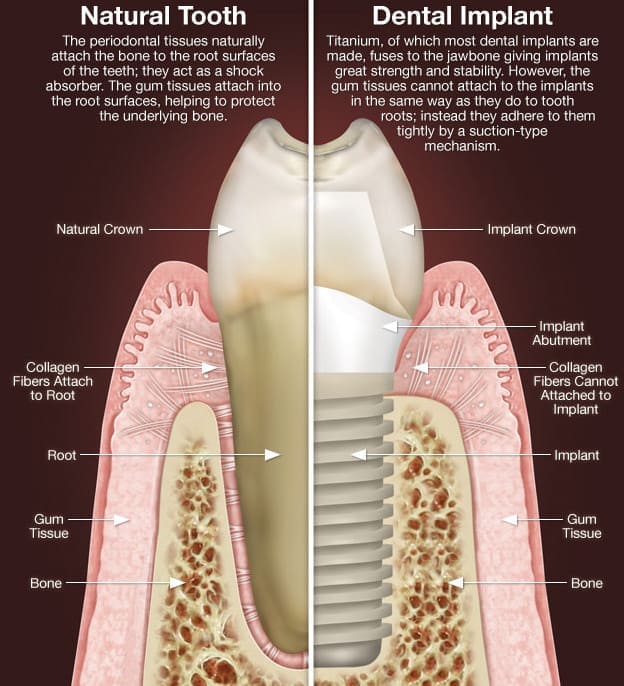Replacement of Missing Teeth

Dental Implant
A dental implant is a replacement for the root or roots of a tooth. Like tooth roots, dental implants are secured in the jawbone and are not visible once surgically placed. They are used to secure crowns (the parts of teeth seen in the mouth), bridgework or dentures by a variety of means. They are made of titanium, which is lightweight, strong, and biocompatible.
Implant supported fixed Bridges (Non-Removable)
When teeth in a row are missing, they can be replaced by a bridge anchored to implants. An implant may not be needed for each tooth being replaced. This is less expensive than placing an individual implant for each tooth being replaced. However, the quality of bone plays an important role in deciding if multiple teeth can be replaced with implant supported bridge. Dental implants are durable and can support the biting forces of teeth when they are anchored together. If you have any questions, please call our office to schedule an appointment with us.
Removable partial denture
Removable partial dentures usually consist of replacement teeth attached to pink or gum-colored plastic bases. A partial denture may have a metal framework and clasps that connect to your teeth, or they can have other connectors that are more natural looking to avoid metal.
Complete denture
Dentures are removable appliances that can replace missing teeth and help restore your smile. If you've lost all of your natural teeth, whether from gum disease, tooth decay or injury, replacing missing teeth will benefit your appearance and your health as you will be able to chew food better.
-
What types of dentures are there?
Conventional denture: This removable full denture is made and placed in your mouth after the remaining teeth are removed, and tissues have healed such as replacing an older denture.
Immediate denture: This removable denture is inserted on the same day that the remaining teeth are removed. You don't have to be without teeth during the healing period but may need to have the denture relined or remade after your gums have healed.
Overdenture: Implants are placed to provide stability and support for the denture. An overdenture fits over a small number implants, and it's much more comfortable to chew and talk.
Implant supported overdenture
An implant-supported denture is a type of overdenture that is supported by and attached to implants. A regular denture rests on the gums and is not supported by implants.
An implant-supported denture is used when a person doesn't have any teeth in the jaw but has enough bone in the jaw to support implants. An implant-supported denture has special attachments that snap onto attachments on the implants.
-
Why consider implant supported over dentures?
Too many people who have conventional dentures don't wear them for the simple fact that they don't stay in place and can't taste food very well. Dental implants offer a way to keep dentures in place and allow you to enjoy your daily life with confidence. In fact, it has been reported that dental implants have the highest success rate of any implanted surgical device.
FAQs about dentures and partials
-
Will eating with new dentures be difficult?
Eating with new dentures will take a little practice. To get used to the new denture, start with soft foods cut into small pieces. Chew slowly using both sides of your mouth. As you get used to new dentures, add other foods until you return to a normal diet. Avoid foods that are extremely sticky or hard. You should also avoid chewing gum while you wear the denture.
-
Will dentures make me look different?
Dentures are made to closely resemble your natural teeth so there should be only a small noticeable change in appearance. In fact, dentures may even improve your smile and fill out your facial appearance.
-
What to expect with new dentures?
New dentures may feel awkward for a few weeks until you become accustomed to them. The dentures may feel loose while the muscles of your cheek and tongue learn to keep them in place. You may find that saliva flow temporarily increases. As your mouth becomes accustomed to the dentures, these problems should go away. Follow-up appointments with the dentist are generally needed after a denture is inserted so the fit can be checked and adjusted. If any problem persists, particularly irritation or soreness, be sure to see your dentist.
Even if you wear full dentures, you still have to practice good dental hygiene. Brush your gums, tongue, and roof of your mouth every morning with a soft-bristled brush before you insert your dentures to stimulate circulation in your tissues and help remove plaque.
If you have any questions please call our office to make an appointment and we will be happy to help you.
-
How to take care of a denture?Review Post op instructions for denture.
-
How to take care of Implant supported denture?
You should remove an implant-supported denture daily to clean the denture and gum area. Just as with regular dentures, you should not sleep with the implant-supported dentures at night. Some people prefer to have implant supported fixed crown and bridgework in their mouths that can't be removed. Your dentist will consider your particular needs and preferences when suggesting fixed or removable options
-
What to expect with new partial denture?
In the beginning, your new partial denture may feel awkward or bulky. This is normal, and you will eventually become accustomed to wearing it.
Inserting and removing the partial denture will require some practice. Follow all instructions given by your dentist. Never force the partial denture into position by biting down. This could bend or break the clasps.
Your dentist will give you specific instruction about how long the denture should be worn and when it should be removed.
If you develop a sore spot after wearing dentures it will need to be adjusted to fit more comfortably.
Start out by eating soft foods that are cut into small pieces. Chew on both sides of the mouth to keep even pressure on both sides. Avoid foods that are extremely sticky or hard.
You may find it difficult to pronounce certain word. With time, you will become accustomed to speaking properly with your partial denture.
-
What do new dentures feel like?
New dentures may feel a little odd or loose for a few weeks until the muscles of the cheeks and tongue learn to keep them in place and you get comfortable inserting and removing them. It is also normal for saliva flow to increase when you first start wearing dentures, but these problems will diminish as the mouth adjusts.
-
Will dentures affect my speech?
After getting dentures, you may have difficulty pronouncing certain words. With practice and with time you will become accustomed to speaking properly with dentures.
Dentures may occasionally slip when you laugh, cough, or smile. Reposition the dentures by gently biting down and swallowing. If any speaking problem persists, please see your dentist.
-
Are dentures worn 24 hours a day?
You should remove dentures before going to bed. This allows gum tissues to rest and allows normal stimulation and cleansing by the tongue and saliva. The denture can be put back in the mouth in the morning. If the denture is delivered immediately after teeth are extracted your dentist may recommend wearing dentures at night for first few days.
-
Should I use a denture adhesive and are they safe?
To enhance satisfaction with a properly constructed denture adhesives enhance retention, stability, bite force, and an individual's sense of security.
Follow the instructions how to use a denture adhesive and as long as it is ADA approved it is safe to use it.
-
Why my denture feels loose, and it hurt to chew?
Over time mouth changes, which can affect the fit of the denture. Your bone and gum ridges can recede or shrink, resulting in a poorly fitting denture.
Dentures that get loose should be relined or remade. Poorly fitting dentures can cause various problems, including sores or infections. See your dentist promptly if your denture becomes loose, and maintain your regular visits, too.
If your denture breaks, cracks or chips, or if one of the teeth becomes loose, call your dentist immediately. In many cases, we can make necessary adjustments or repairs, often on the same day. Complicated repairs may require that the denture be sent to a special dental laboratory.
Trucare Dentistry in Roswell GA offers dental implant treatment and replace missing teeth over 10 years now, keeping family dental care personalized with great care.



